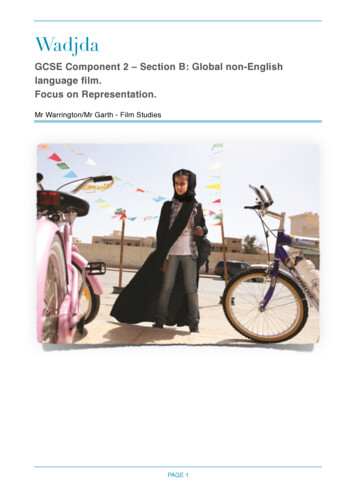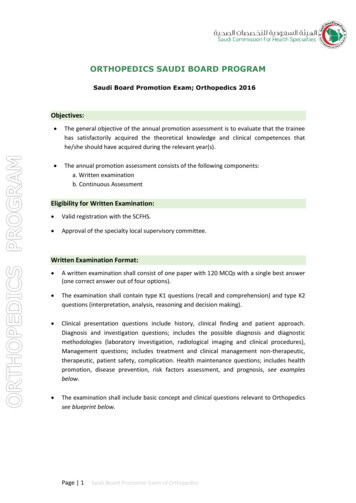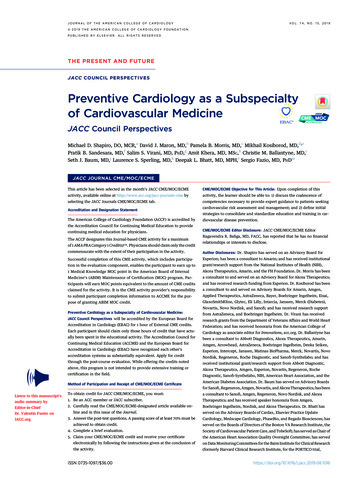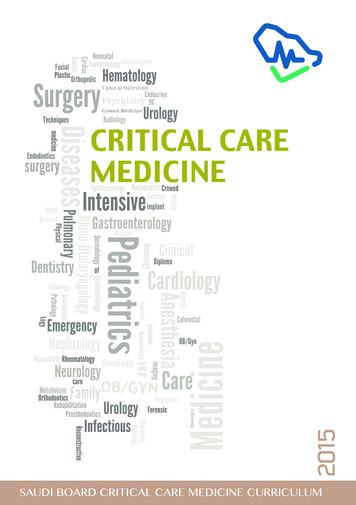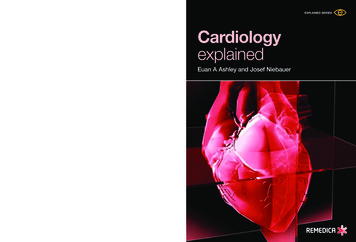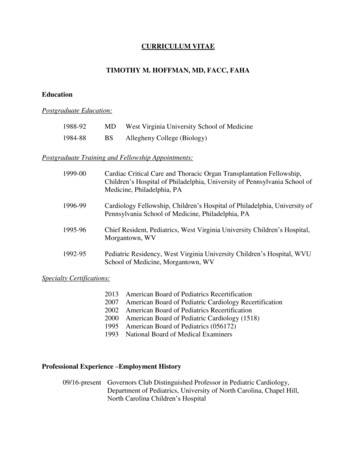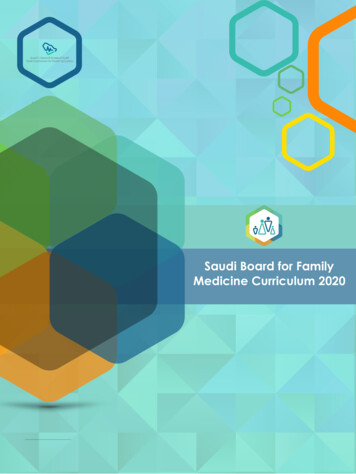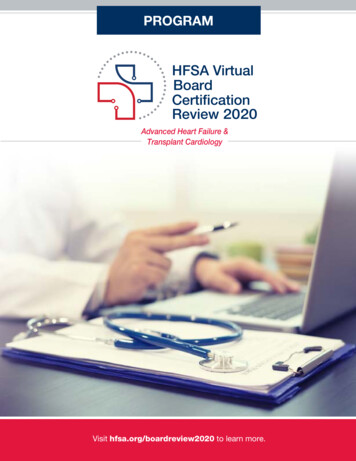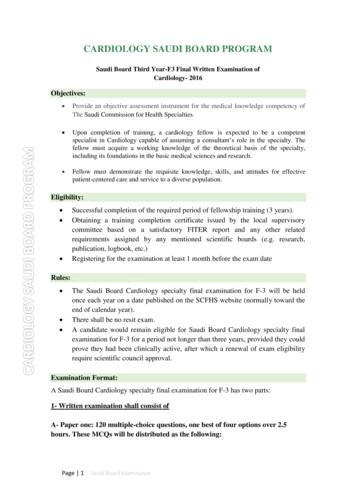
Transcription
CARDIOLOGY SAUDI BOARD PROGRAMSaudi Board Third Year-F3 Final Written Examination ofCardiology- 2016Objectives: Provide an objective assessment instrument for the medical knowledge competency ofThe Saudi Commission for Health Specialties. Upon completion of training, a cardiology fellow is expected to be a competentspecialist in Cardiology capable of assuming a consultant’s role in the specialty. Thefellow must acquire a working knowledge of the theoretical basis of the specialty,including its foundations in the basic medical sciences and research. Fellow must demonstrate the requisite knowledge, skills, and attitudes for effectivepatient-centered care and service to a diverse population.Eligibility: Successful completion of the required period of fellowship training (3 years).Obtaining a training completion certificate issued by the local supervisorycommittee based on a satisfactory FITER report and any other relatedrequirements assigned by any mentioned scientific boards (e.g. research,publication, logbook, etc.)Registering for the examination at least 1 month before the exam dateRules: The Saudi Board Cardiology specialty final examination for F-3 will be heldonce each year on a date published on the SCFHS website (normally toward theend of calendar year).There shall be no resit exam.A candidate would remain eligible for Saudi Board Cardiology specialty finalexamination for F-3 for a period not longer than three years, provided they couldprove they had been clinically active, after which a renewal of exam eligibilityrequire scientific council approval.Examination Format:A Saudi Board Cardiology specialty final examination for F-3 has two parts:1- Written examination shall consist ofA- Paper one: 120 multiple-choice questions, one best of four options over 2.5hours. These MCQs will be distributed as the following:Page 1Saudi Board Examination
1. Basic sciences2. cardiac physiology/pathology3. Clinical examination4. Coronary artery disease5. Valvular diseases6. Cardiomyopathies/Heart Failure7. Pericardial/systemic diseases8. Aortic diseases9. Arrhythmias10. Adult congenital heart diseases11. Hypertension12. Pre-op assessment13. Pregnancy and cardiac diseases14. Cardiac pharmacology15. Cardiac biostatic/ethics16.B- Paper two: Data interpretation over 3 hours will be distributed as the following:1- 6 echo studies (see attached Key answer)2- 6 coronary angiograms (MCQs-based)3- 6 nuclear studies (MCQs-based)4- 6 hemodynamic tracings (MCQs-based)5- 2 EP tracings (MCQs-based)6- 1 CT-angio (MCQs-based)7- 1 cardiac MRI (MCQs-based)8- 2 Holter monitors (MCQs-based)9- 25 ECGs (see attached Key answer)Examination Conduct and Duration:Paper-1 over 2 1/2 hours duration and paper-2 over 3 hours.Written exam will be delivered as a computer based test when available, otherwisepaper and pencil.Passing Score:The passing score is 70%. However, if the percentage of candidates passing theexamination is less than 70%, the passing score can be lowered by one mark at aPage 2Saudi Board Examination
time aiming at achieving 70% passing rate or 65% passing score whichever comesfirst. Under no circumstances can the passing score be reduced below 65%.Negative marking is NOT allowed.Declaration of Result:The Cardiology Examination Committee shall approve the examination result before itsannouncement.Exemption:SCFHS at present has no reciprocal arrangement with respect to this examination orqualification by any other college or board, in any specialty.Suggested References for Saudi Board Final Written/Clinical Examinations ofCardiology1. Heart Disease- A textbook of cardiovascular medicine By Braunwald, Zipes andLibby2. Cardiology By M. Crawford, J. DiMarco and W. Paulus3. Textbook of Interventional Cardiology By Topol4. Textbook of Clinical Echocardiography By C. Otto5. Feigenbaum's Echocardiography6. The Echo Manual By J. Oh7. ASE's Comprehensive Echocardiography8. Hemodynamic Rounds By M. Kern9. The Art and Science of bedside diagnosis By Sapira10. Interventional Cardiology By Singer11. Mayo Clinic Cardiovascular Board Review By J. Murphy and M. LloydNote: strongly suggested ReferencesBlueprint outlines (Saudi Board third year-F3 Examination: Cardiology)Page 3Saudi Board Examination
Basic sciences/HTNCardiac PATHOLOGYPHYSICAL examinationCardiac PHYSIOLOGYEthicsStatisticsAortic diseasesCAD/pre-op assessmentCardiomyopathies/Heart Failure /pregnancyCardiac ArrhythmiaValvular diseasessAdult congenital heart diseasesACHD/Pulmonary HTNCardiac pharmacologyTotalPage 4Saudi Board ExaminationProportion 3-62-5120
Example QuestionsEXAMPLES OF MCQs :1.(Item ID)Answer: enceHypertensionN/ATreatmentPart 1K1NewN/AIn the emergency treatment of accelerated hypertensionA- Intravenous sodium nitroprusside is usually necessary to control the severe hypertensionB- Parenteral therapy is preferable to oral therapyC- Vasodilator therapy to reduce the afterload should be usedD- ACE inhibitors are indicated if renal artery stenosis is suspected2.(Item ID)Answer: enceCardiac PharmacologyN/ATreatmentPart 1K1NewN/AWhich of the following is not a side effect of ACE inhibitors?A. (Item ID)Answer: encePage 5Valvular diseasesN/ADiagnosisPart 1K2NewN/ASaudi Board Examination
This two-dimensional echocardiogram was most likely recorded in which of the followingpatients?A- A 54-year-old nab with syncopal episodes when bending forwardB- A previously health 68-year-old man with sudden onset of pulmonary edema and a newholosystolic murmurC- A 17-year-old girl with atypical chest pain and a midsystolic clickD- A 42-year-old woman with palpitations, exertional dyspnea, and episodes of hemoptysis4.(Item ID)Answer: enceArrhythmiasN/APathophysiologyPart 1K2NewN/AIn a patient with a recurrent AV nodal re-entry tachycardiaA- Adenosine is the prophylactic therapy of first choiceB- The cardiac rate is often 160-220 beats per minuteC- Polyuria after a prolonged episode is characteristicD- Transient bundle branch block on ECG indicates coexistent myocardial ischemiaPage 6Saudi Board Examination
A Saudi Board Cardiology specialty final examination for F-3 has two parts: 1- Written examination shall consist of A- Paper one: 120 multiple-choice questions, one best of four options over 2.
